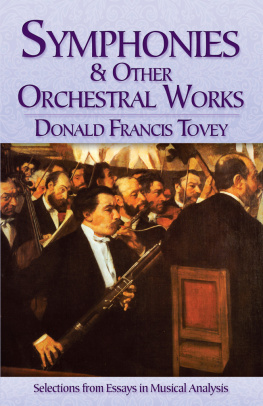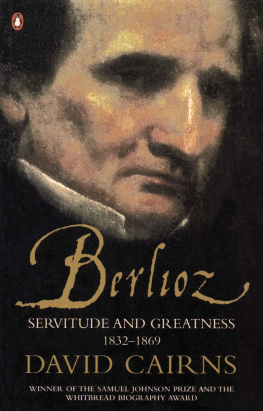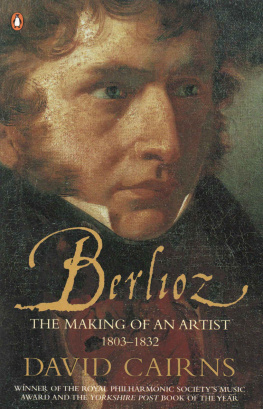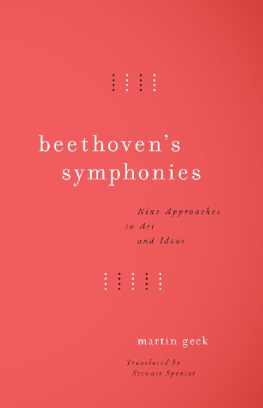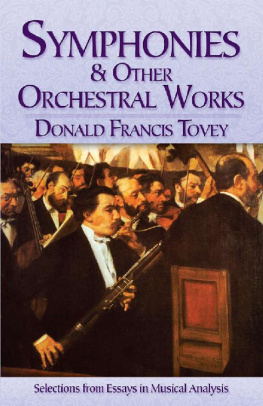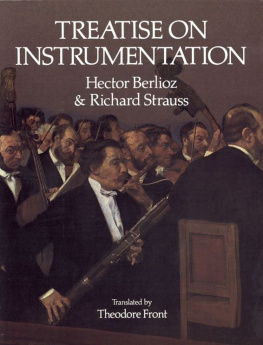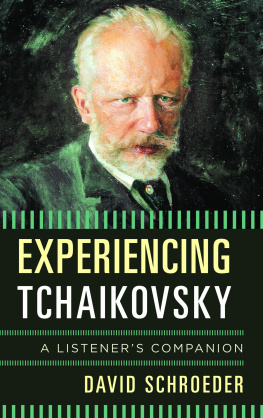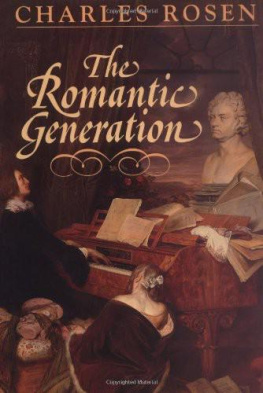T hanks to the usual family members: Elaine, Paul, Karen, and Kate, plus two new ones, Eli and Zoe. Thanks as always to Bob Levine, whos as good at this now as when we started working together fourteen years and nine books ago. Thanks to Bernie Rose for suggesting the topic, which turned out to be far more challengingand exhilaratingthan I imagined.
Accompanying online audio is available at: https://textbooks.rowman.com/berlioz-listener
1. Symphonie fantastique, first movement. Lyon National Orchestra, conducted by Leonard Slatkin (14.37).
2. Roman Carnival Overture. Polish State Philharmonic Orchestra, Katowice, conducted by Kenneth Jean (8:46).
3. Romo et Juliette, part 2, Scne damour. Lyon National Orchestra, conducted by Leonard Slatkin (16.31).
4. La Damnation de Faust, part 3 . Autrefois un Roi de Thul, Marie-Ange Todorovich as Marguerite; Orchestre Nationale de Lille, conducted by Jean-Claude Casadesus (4:22).
5. La Damnation de Faust, part 4. Nature immense (Invocation to Nature), Michael Myers as Faust; Orchestre Nationale de Lille, conducted by Jean-Claude Casadesus (4:13).
6. La Damnation de Faust, part 4. La Course lAbme (The Ride to the Abyss). Michael Myers as Faust; Alain Vernhes as Mphistophls; Orchestre Nationale de Lille, conducted by Jean-Claude Casadesus (3:39).
7. Requiem (Grand Messe des Morts). Lacrimosa. Elora Festival Orchestra, Toronto Mendelssohn Choir, Toronto Mendelssohn Youth Choir, conducted by Noel Edison (9:45).
8. Au Cimetire (Clair de Lune), from Les Nuits dt. Soile Isokoski, mezzo-soprano, Helsingin kaupunginorkesteri, conducted by John Storgrds (5:05).
9. Lle inconnue, from Les Nuits dt. Soile Isokoski, mezzo-soprano, Helsingin kaupunginorkesteri, conducted by John Storgrds (4:11).
Recordings are licensed under permission of Naxos of America, Inc. Naxos of America, Inc.
Abbate, Carolyn, and Roger Parker. A History of Opera. New York: W. W. Norton, 2012.
Barzun, Jacques. Berlioz and The Romantic Century, vols. 1 and 2. Boston: Little, Brown and Co., 1950.
Berlioz, Hector. Batrice et Bndict, Opra-comique en 2 actes. New York: Edwin F. Kalmus
Berlioz, Hector. Evenings with the Orchestra. Translated and edited by Jacques Barzun. Chicago: University of Chicago Press, reprinted 1999.
Berlioz, Hector. La damnation de Faust, Dramatic Legend in Four Parts. London: Ernst Eulenberg, 1964.
Berlioz, Hector. Le Carnaval Romain, Overture for Orchestra. London: Ernst Eulenberg, 1972.
Berlioz, Hector. Le Corsaire, Overture for Orchestra. London: Ernst Eulenberg, 1981.
Berlioz, Hector. Lelio (The Return to Life). New York, Edwin F. Kalmus.
Berlioz, Hector. LEnfance du Christ, Op. 25, Mineola, NY: Dover Publications, 1999.
Berlioz, Hector. Les Francs Juges, Overture for Orchestra. London: Ernst Eulenberg.
Berlioz, Hector. Les nuits dt, Op. 7. Complete Song Cycle in Full Score and Vocal Score. Mineola, NY: Dover Publications, 2003.
Berlioz, Hector. Les Troyens. Grand Opra en cinq actes. Vocal score. Kassel, Germany: Brenreiter, 2003.
Berlioz, Hector. Les Troyens. Program notes accompanying complete opera conducted by John Nelson. Erato CD 019025762209.
Berlioz, Hector. Memoirs of Hector Berlioz. Translated, edited and introduced by David Cairns. London: Victor Gollancz, 1969.
Berlioz, Hector. Requiem, Op. 5 in Full Score. Mineola, NY: Dover Publications, 2006.
Berlioz, Hector. Romo et Juliette, Symphonie dramatique, Op. 17. London: Ernst Eulenberg.
Berlioz, Hector. Symphonie fantastique and Harold in Italy. Full score, edited by Charles Malherbe and Felix Weingartner. Mineola, NY: Dover Publications, 1984.
Bloom, Peter, ed. The Cambridge Companion to Berlioz. Cambridge, UK: Cambridge University Press, 2000.
Cairns, David. Berlioz: The Making of an Artist. Berkeley: University of California Press, 2000.
Cairns, David. Berlioz: Servitude and Greatness. Berkeley: University of California Press, 2000.
Cone, Edward T. Berliozs Divine Comedy: the Grande Messe des Morts. Paper published by University of California, 1980.
Dean, Winton. Essays on Opera. Oxford: Clarendon Paperbacks, 1990.
Dickinson, Alan E.F. The Music of Berlioz. New York: St, Martins Press, 1972.
Guinn, John, and Les Stone, eds. The St. James Opera Encyclopedia. Detroit: Visible Ink Press, 1997.
Holoman, D. Kern. Berlioz. Cambridge, MA: Harvard University Press, 1989.
Kennedy, Michael, ed. The Oxford Dictionary of Music. 2nd ed. Oxford: Oxford University Press, 1994.
Kerman, Joseph. Opera and the Morbidity of Music. New York: New York Review Books, 2008.
Libbey, Ted. The NPR Listeners Encyclopedia of Classical Music. New York: Workman Publishing, 2006.
Munch, Charles. I Am a Conductor. Translated by Leonard Burkat. New York: Oxford University Press, 1955.
Padgett, Ron, ed. The Teachers and Writers Handbook of Poetic Forms. New York: Teachers and Writers Collaborative, 1987.
Rosen, Charles. The Romantic Generation. Cambridge, MA: Harvard University Press, 1995.
Shakespeare, William. The Tempest, ed. Frank Kermode. London: Routledge, reprinted 1987.
Tovey, Donald Francis. Essays in Musical Analysis, Vol. IV: Illustrative Music, 5th ed. London: Oxford University Press, 1946.
Tovey, Donald Francis. Essays in Musical Analysis, Vol. VI: Supplementary Essays, 4th ed. London: Oxford University Press, 1945.
Tresize, Simon, ed. The Cambridge Companion to French Music. Cambridge, UK: Cambridge University Press, 2015.
Berlioz: Musical Dramatist and Experimenter
A lthough he was one of the seminal figures in the romantic movement, Hector Berliozs musical legacy is laden with paradox. Nearly every major work by Berlioz can baffle and even displease on first hearing. Further acquaintance may reverse that, or it may not. His style is so individual, restless, and dramatic that some find it exhausting. But without question, while acknowledged as a major figure in nineteenth-century music and a seminal figure in the romantic movement, he can be problematic.
A quick look at his oeuvre reveals a variety of forms, including two symphonies, of which the Symphonie fantastique is by far the most performed of his works. Although not the first piece of program music, meaning that it has a narrative, and neither standard in form nor content, its surely the most influential. There are three operas and four drama-driven sacred works by this decidedly nonreligious man of the world. Six concert overtures, of which two are popular and appreciated, represent his style at its most approachable, though these, too, are wild and restless creations. Perhaps most characteristic of Berliozs passions and ambitions are the two hybrids of symphony and drama, one based on Romeo and Juliet, the other on Faust. Clearly, Berlioz was preeminently a composer of musical drama under various guises. Even the song cycle Les Nuits dtSummer Nightsalthough quieter than anything else, is no less intense in its affective depictions of the six poems chosen. In fact, theyre as restless as anything else by Berlioz, and immensely influential on composers who copied this first orchestral song cycle. LEnfance du ChristThe Childhood of Christ, which he called a sacred trilogycontains much thats dreamlike and sweet, but also long passages that vividly depict the anxieties and terrors of such disparate biblical characters as the virgin mother Mary and the wicked but tormented King Herod. The point is that Berlioz is preeminently, and perhaps exclusively, a composer of musical drama, no less than his great contemporaries (and friends) Verdi and Wagner. With a few notable exceptions, no two of his works are alike, each an experiment of some sort.


